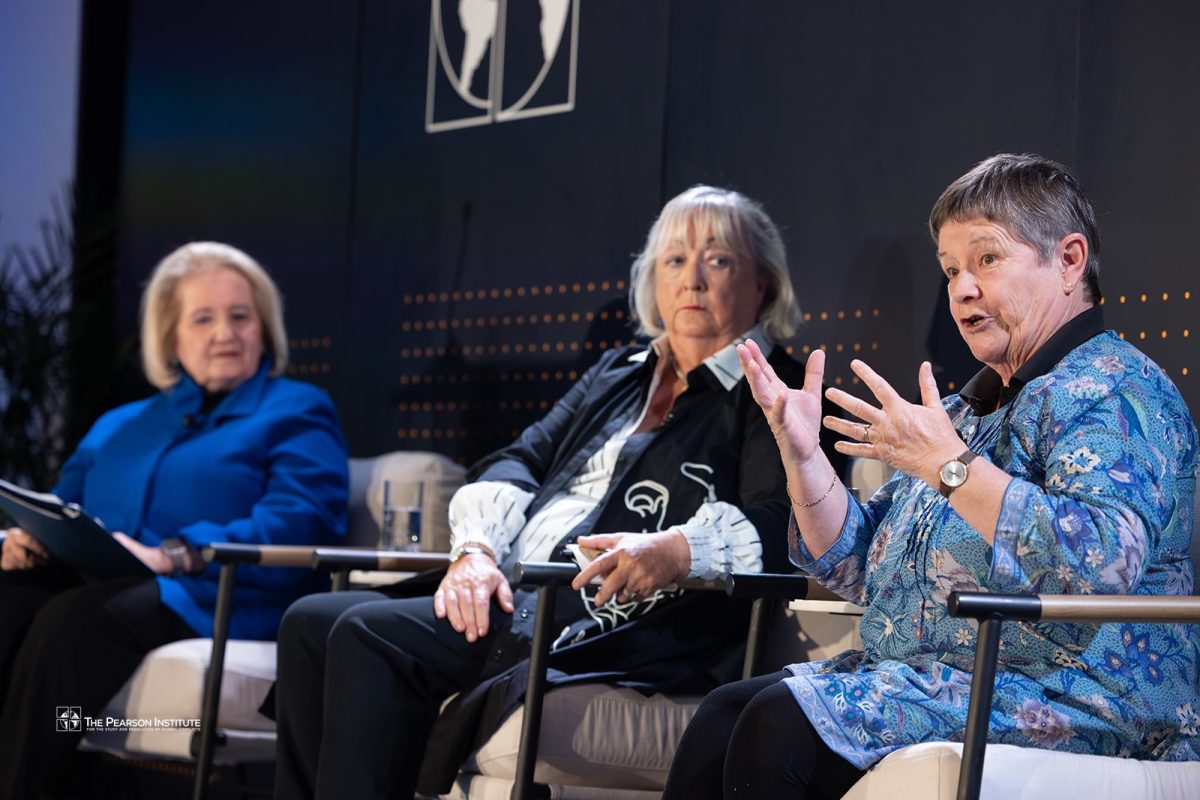Scholars, policymakers, and journalists convened on October 18 for the seventh annual Pearson Global Forum, held by the Pearson Institute for the Study and Resolution of Global Conflicts. Lessons from past conflicts informed the day’s panel discussions, fireside chats, and flash talks on reaching long-term resolutions to the conflicts in Gaza and worldwide.
“More than a third of peace agreements collapse within five years of when they were enacted,” Melanne Verveer, former U.S. ambassador-at-large for global women’s issues, began her keynote address, citing U.N. data. She suggested that women must play a key role in improving those numbers. “Evidence shows that women’s participation contributes to more successful negotiations and more sustainable peace agreements,” she said.
Monica McWilliams, co-founder of the Northern Ireland Women’s Coalition, echoed the sentiment. “[Women] may not be in the headlines, but they were always on the frontlines…. The first day I walked into the peace talks [that led to the resolution of the Northern Ireland conflict in 1998], there were 70 people, all men. We were the only two women,” McWilliams said in a panel discussion. She hoped the successful negotiation would be a model. “Let this be a lesson to the Middle East,” she said.
Kicking off the day’s talks, Colombia’s former High Commissioner for Peace Sergio Caro urged policymakers to take peace negotiations “as seriously as people take preparation for war,” given weakened major players and the “broken-down system of the U.N.”
Factors overlooked in conflict resolution and U.S. oversights were another major theme of the day.
William Benton Professor in Psychology Boaz Keysar spoke about the usefulness of a lingua franca, a language spoken by both parties but native to neither. He said his research showed that when operating in a second language, people were less loss averse, more utilitarian, and more willing to take risks that could be beneficial to them.
Speakers shared doubts about the U.S.’s ability to lead on the global stage, and in the forum’s first panel on the problems of negotiation implementation, they considered China as a potential alternative arbiter. Melani Cammett, professor of international affairs at Harvard, said there had been a “loss of credibility” so that the U.S. is “now viewed as too one-sided to be an honest broker.”
Forum founder and recent Nobel laureate in economics James Robinson observed opposite approaches in U.S. and Chinese intervention in the Democratic Republic of the Congo (DRC). “All they do is lecture,” Robinson said of the U.S., a characteristic he attributed to a history of colonialism and imperialism. Driven by purely economic interests, “the Chinese don’t do that,” he said. China has been involved in the construction of major infrastructure in the DRC.
A panel entitled “Future of Peace, Israel, and Palestine” examined the obstacles to resolving the Israel-Hamas war. Earlier in the day, NPR international correspondent Aya Batrawy addressed Israel’s recent killing of Hamas leader Yahya Sinwar. “Is diplomacy dead?” she asked, finally. Cammet said a diplomatic resolution to the war didn’t seem likely at the moment. “The reality of the incentives on the ground is that it’s not a moment for discussion, negotiation, and peacemaking,” Cammett responded. “Killing the leaders doesn’t undermine the movement.”
The agenda also allocated time to conflicts that receive less global attention. PBS’s Leila Molana-Allen, who has covered the humanitarian crisis in Sudan on the ground since it escalated in April 2023, said, “No one is paying attention to this conflict,” adding that it could destabilize the region if left unaddressed.
Over the day’s course, the talks prompted audience members to reconsider the path to “negotiation and agreement” in a volatile political climate. When it comes to peace talks, “prepare to be a long-flight bird,” McWilliams advised.









